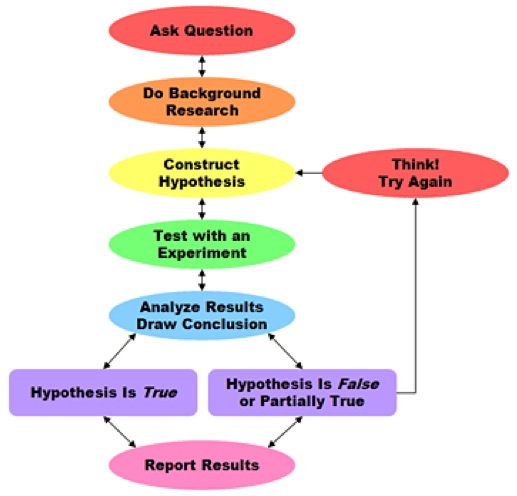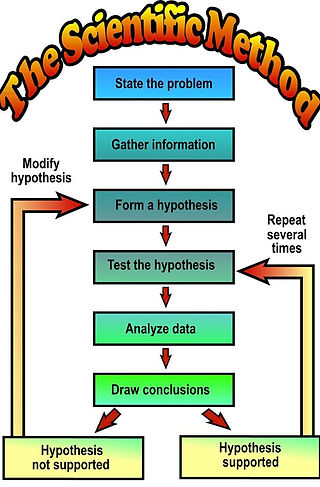Really thought of putting this somewhere like "science and religion" sub forum, but since I'm fairly sure science cannot explain SM's existence, I do think of it as philosophical inquiry.
Anyway, here are several things about the scientific method that I've heard, some on this site:
- there is no single method
- (therefore) "the" scientific method is actually a myth
- it is the best method we have for explaining and/or investigating phenomenon
- it is the process by which science is carried out
- it is unique to science
> And then there are all the various claims about what the method(s) may entail. And they are numerous. I think it is possible to find agreement on 'what is the scientific method.' But in my experience (and I've been on a few scientific type forums), it is very rare to find two people that will share exact same understanding of what the method is. Thus, it truly does lack consistency.
Plus as noted above, there is definitely the notion, among scientific types, that 'the' method is mythological. It doesn't exist other than as a way to introduce scientific concepts (or particular branches of science) to people first learning about science. The idea that the 'scientific method' (as if there is one, universally accepted method) is myth is, IMO, a very obscure notion. I think some people are tuned into that notion as fact (that the method is not singular, and to think it is, is to adhere to a myth). I think around 80% to 95% of the population (including some scientific types) do think there is a single scientific method.
And that this single method is the best we, as humanity can (or so far have) come up with to investigate the nature of shared reality, namely the physical realm.
I (obviously) see all such claims as disputable. Like how can the best method for investigating nature be (fairly well) known among its practitioners to be mythological? Or how can it be said to be unique to science, when almost every aspect about the mythological method and the existing techniques (other methodologies, more likely being employed by practitioners) are inherently philosophical?
I'm perhaps biting off a bunch in this thread, but I do think such explorations are all viable for what I as OP wish to explore. Yet, the fundamental thing that this thread is about is how does science explain the existence of the scientific method? I don't think - there's no way to answer that. Instead, I think there is no way to consistently answer that. I further think there is plausibly no scientific way to answer that.
Like, I'm aware that it is around the 17th century that the hypothetical method came about as basis for all scientific inquiry (from that point) and that this stems from essentially previous work in natural philosophy, which dates back to Aristotle if not earlier. But my awareness of this and all the many (great many) details not being included in this history are for me not founded by science. More like, historical revisionism, and in a sense wishful thinking. Not trying to convey that in a willy nilly way, but am saying that we currently aren't really using even the mythological scientific method to establish the existence of the (mythological) scientific method. More like a claim that is taken as fact and when asking someone to back this up, well... I predict some will pretend to speak with authority as if their version of scientific history is not willy nilly and is 'very well understood.' Yet, will they actually be using science to back up the claim or an argument from authority?
Anyway, in the off chance that someone reading this thread truly thinks they can use the 'greatest method ever' to explain the (alleged) existence of 'greatest method ever,' I've created this thread to go ahead and give it your best shot. Maybe we can also use that method to understand why it is the greatest, and what all other methods are being considered in that pool, and how it is being determined as 'greatest.'
Anyway, here are several things about the scientific method that I've heard, some on this site:
- there is no single method
- (therefore) "the" scientific method is actually a myth
- it is the best method we have for explaining and/or investigating phenomenon
- it is the process by which science is carried out
- it is unique to science
> And then there are all the various claims about what the method(s) may entail. And they are numerous. I think it is possible to find agreement on 'what is the scientific method.' But in my experience (and I've been on a few scientific type forums), it is very rare to find two people that will share exact same understanding of what the method is. Thus, it truly does lack consistency.
Plus as noted above, there is definitely the notion, among scientific types, that 'the' method is mythological. It doesn't exist other than as a way to introduce scientific concepts (or particular branches of science) to people first learning about science. The idea that the 'scientific method' (as if there is one, universally accepted method) is myth is, IMO, a very obscure notion. I think some people are tuned into that notion as fact (that the method is not singular, and to think it is, is to adhere to a myth). I think around 80% to 95% of the population (including some scientific types) do think there is a single scientific method.
And that this single method is the best we, as humanity can (or so far have) come up with to investigate the nature of shared reality, namely the physical realm.
I (obviously) see all such claims as disputable. Like how can the best method for investigating nature be (fairly well) known among its practitioners to be mythological? Or how can it be said to be unique to science, when almost every aspect about the mythological method and the existing techniques (other methodologies, more likely being employed by practitioners) are inherently philosophical?
I'm perhaps biting off a bunch in this thread, but I do think such explorations are all viable for what I as OP wish to explore. Yet, the fundamental thing that this thread is about is how does science explain the existence of the scientific method? I don't think - there's no way to answer that. Instead, I think there is no way to consistently answer that. I further think there is plausibly no scientific way to answer that.
Like, I'm aware that it is around the 17th century that the hypothetical method came about as basis for all scientific inquiry (from that point) and that this stems from essentially previous work in natural philosophy, which dates back to Aristotle if not earlier. But my awareness of this and all the many (great many) details not being included in this history are for me not founded by science. More like, historical revisionism, and in a sense wishful thinking. Not trying to convey that in a willy nilly way, but am saying that we currently aren't really using even the mythological scientific method to establish the existence of the (mythological) scientific method. More like a claim that is taken as fact and when asking someone to back this up, well... I predict some will pretend to speak with authority as if their version of scientific history is not willy nilly and is 'very well understood.' Yet, will they actually be using science to back up the claim or an argument from authority?
Anyway, in the off chance that someone reading this thread truly thinks they can use the 'greatest method ever' to explain the (alleged) existence of 'greatest method ever,' I've created this thread to go ahead and give it your best shot. Maybe we can also use that method to understand why it is the greatest, and what all other methods are being considered in that pool, and how it is being determined as 'greatest.'








